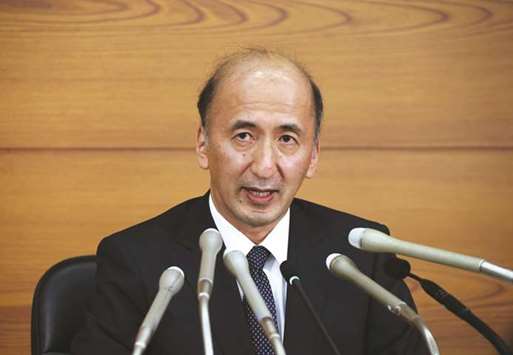Japan’s declining population could eventually pose a risk to its regional banks and financial system, Bank of Japan deputy governor Hiroshi Nakaso said in the last of three key speeches that may serve as his swan song after nearly four decades at the central bank.
Because they depend more on interest income than the international average, Japan’s regional banks suffer from low profitability, given the current interest-rate environment and intense competition. But there is currently no concern about large-scale systemic risk, he said.
“Regional financial institutions need to appropriately address this issue in order to continue to play an important role in supporting the regional economy,” Nakaso said yesterday in Tokyo.
Due to step down in March, Nakaso, 64, spent months preparing the speeches with the end of his term in mind, according to people familiar with the central bank’s discussions.
Nakaso chose risks to the financial system as the topic of his last major speech because that’s what he feels most strongly about, according to the people.
Nakaso has played a role in addressing some of the biggest challenges in the modern era of central banking, including Japan’s banking crisis, its long battle with deflation and the chaos in the global economy that came after the collapse of Lehman Brothers Holdings.
He led efforts to stabilise Japan’s financial system in the late 1990s, when banks and one of the country’s largest securities firms collapsed. That situation was so dire a number of bank executives who Nakaso worked with committed suicide around that time, according to the people.
“The experience of the 1990s was costly and sometimes very painful,” he wrote in a paper published in October 2001. Some private economists see a chance that Prime Minister Shinzo Abe will appoint Nakaso to lead the BoJ when governor Haruhiko Kuroda’s term ends in April, though Kuroda is widely expected to be asked to serve another term, according to a Bloomberg survey.
Nakaso gave the first two of his final speeches in October. In the first, delivered in London on October 5, he described the progress made in reviving Japan’s economy while challenging the “negative image” of stagnation, pointing to improving living standards.
He also stressed the need for labour market reform to increase worker mobility and productivity. Nakaso said it was “only a matter of time” before the BoJ achieved 2% inflation and vanquished deflation for good.
“We have come a long way in our conquest of deflation,” he said in London. “Looking back at the policy responses, although there were successes, I have to admit that there were also shortfalls, as well as a couple of false dawns. But we have learned some lessons. This time around, there seem to be more reasons to believe that the true dawn is near.”
Reflecting the personal nature of the speech, Nakaso concluded by reciting a work of an eighth-century Japanese poet, and a drawing he did himself was attached to the text.
In New York two weeks later, Nakaso discussed the evolution of monetary policy, saying he “takes some pride” in the BoJ’s development of new policy instruments during its navigation of “uncharted waters.”
“Nakaso is known as a ‘BoJ man’,” said Chotaro Morita, chief rates strategist at SMBC Nikko Securities. “He must have wanted to send some messages and share the lessons he has learned before his term is over.”
During his time as deputy governor, he supported every decision by Kuroda, proving wrong early suspicions that a career central banker would struggle to support his new boss from the outside in carrying out radical monetary policy.
“It’s hard to gauge how Nakaso has affected policy decisions in the current regime,” Morita said. “It’s Kuroda’s BoJ and what Kuroda thinks matters most.”
Nakaso enjoys a tight-knit circle of contacts among global central bankers to a degree that is rare among BoJ officials, according to the people. He headed the markets committee at the Bank for International Settlements from 2006 to 2013 and chaired a Group of 20 study group on commodities. As a BoJ executive director, he closely communicated with his counterparts during the global financial crisis.
Takahide Kiuchi, who as a BoJ board member worked with Nakaso for four years until his term expired in July, praised the deputy governor for his international perspective.
“He communicated closely with counterparts abroad - not only central bankers but also hedge funds and academics,” Kiuchi said. “He isn’t a person who looks at the BoJ with only the perspective from inside the institution. That was well appreciated at the BoJ.”

Nakaso: No concern about large-scale systemic risk.
